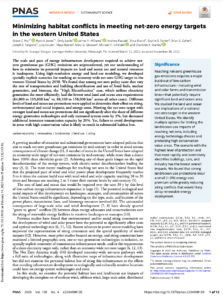Full Title: Minimizing Habitat Conflicts in Meeting Net-Zero Energy Targets in the Western United States
Author(s): Grace C. Wu, Ryan A. Jones, Emily Leslie, James H. Williams, Andrew Pascale, Erica Brand, Sophie S. Parker, Brian S. Cohen, Joseph E. Fargione, Julia Souder, Maya Batres, Mary G. Gleason, Michael H. Schindel, and Charlotte K. Stanley
Publisher(s): Sustainability Science
Publication Date: January 19, 2023
Full Text: Download Resource
Description (excerpt):
The scale and pace of energy infrastructure development required to achieve net-zero greenhouse gas (GHG) emissions are unprecedented, yet our understanding of how to minimize its potential impacts on land and ocean use and natural resources is inadequate. Using high-resolution energy and land-use modeling, we developed spatially explicit scenarios for reaching an economy-wide net-zero GHG target in the western United States by 2050. We found that among net-zero policy cases that vary the rate of transportation and building electrification and use of fossil fuels, nuclear generation, and biomass, the “High Electrification” case, which utilizes electricity generation the most efficiently, had the lowest total land and ocean area requirements (84,000 to 105,000 km2 vs. 88,100 to 158,000 km2 across all other cases). Different levels of land and ocean use protections were applied to determine their effect on siting, environmental and social impacts, and energy costs. Meeting the net-zero target with stronger land and ocean use protections did not significantly alter the share of different energy generation technologies and only increased system costs by 3%, but decreased additional interstate transmission capacity by 20%. Yet, failure to avoid development in areas with high conservation value is likely to result in substantial habitat loss.
